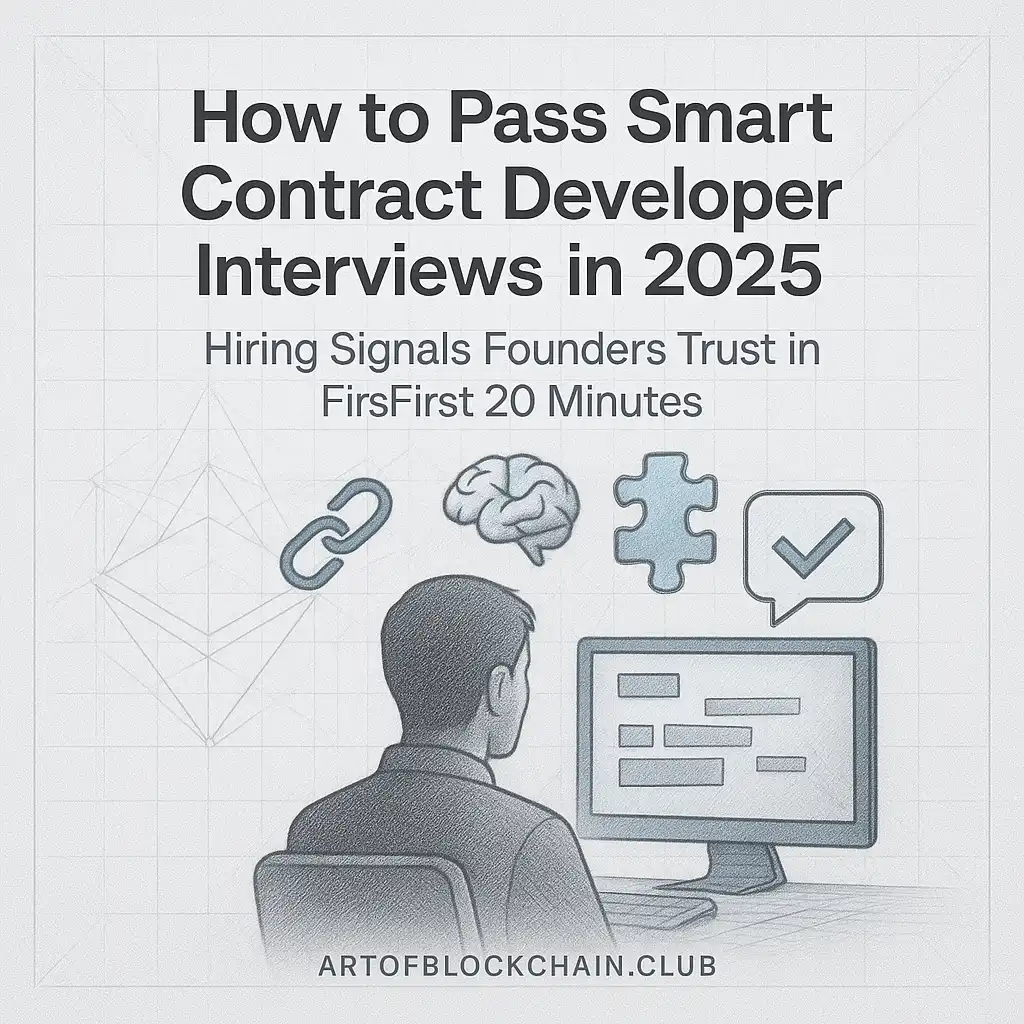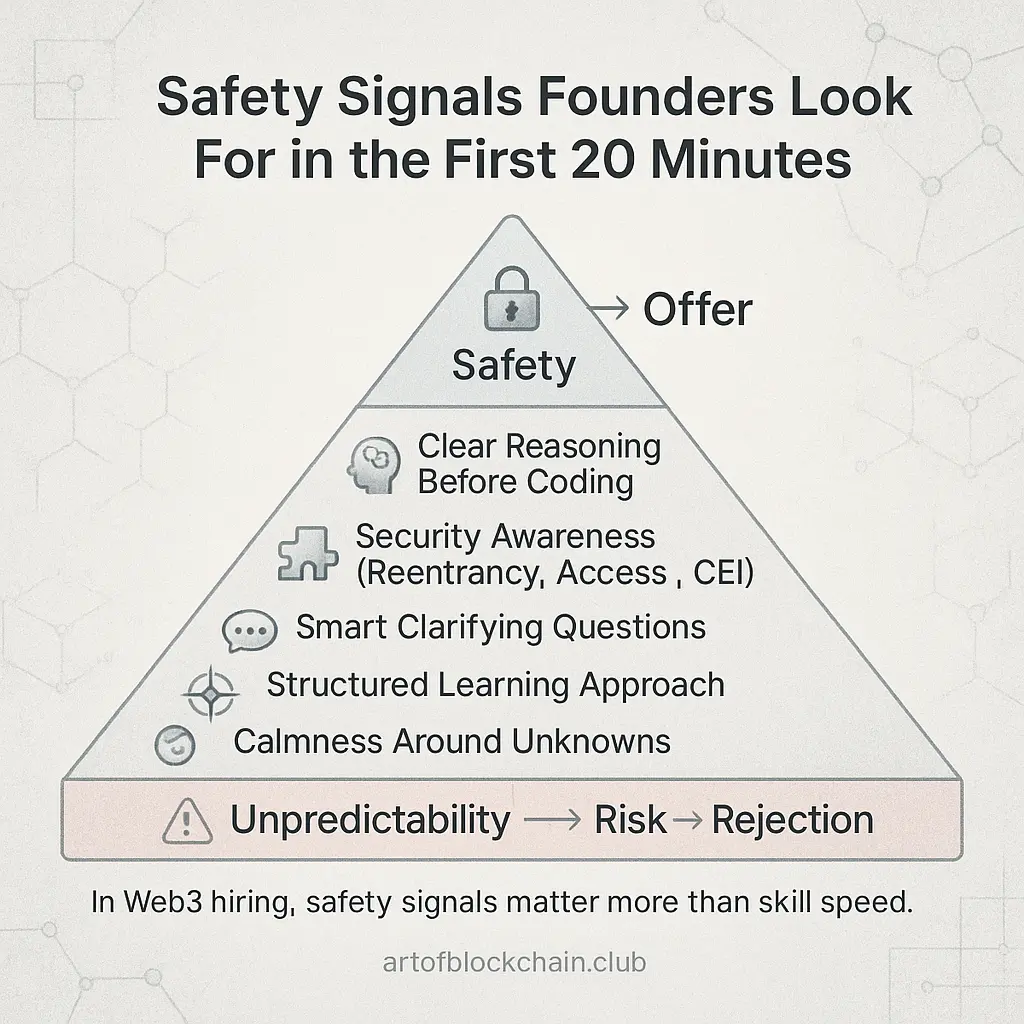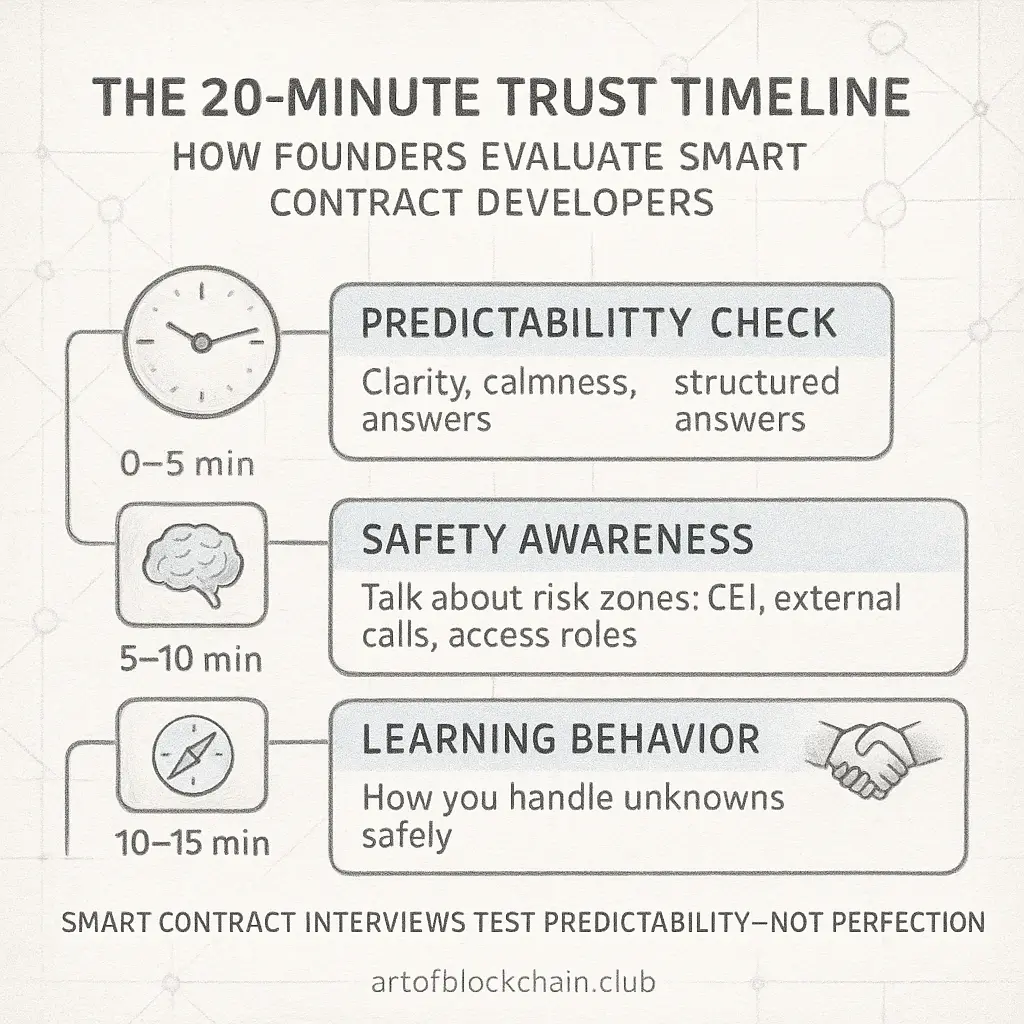How to Pass Smart Contract Developer Interviews in 2025: Hiring Signals Founders Trust in the First 20 Minutes

Skills are not your biggest challenge
Every week, Smart Contract developers apply to Web3 startups with clean GitHub profiles, personal DApps, solidity practice, and strong motivation. Yet the rejections come before they even get a chance to show their technical skills. This creates a frustrating belief: “They don’t give juniors a fair chance.”
At ArtofBlockchain.club, we study blockchain hiring patterns across global companies. What we see consistently is that Smart Contract interviews begin as risk evaluations, not coding assessments. Because blockchain roles carry production responsibility from day one, founders must determine early whether a junior developer will be predictable and safe to trust around live contracts.
The first 20 minutes of conversation are where founders decide: “Will this candidate protect our protocol — or put it at risk?”
This article explains how to pass that filter clearly and confidently.
TL;DR — Why Smart Contract juniors fail before technical rounds
Founders judge predictability before they judge skill.
Your early communication must show:
Clear reasoning before writing code
Awareness of security risk zones
Ability to ask smart clarifying questions
Structured approach to learning
Calmness around unknowns
The result is simple:
Predictability → Safety → Offer
Unpredictability → Risk → Rejection
Smart Contract hiring is a safety decision first
One wrong modification in a blockchain system can freeze assets, break token logic, or allow silent fund drains. Founders know attackers only need one overlooked assumption. That is why Smart Contract interviews test risk posture from the first answer you give.
Hiring managers are evaluating:
Will you catch a dangerous flaw before deployment?
Will you expose potential exploits during design?
Will you ask for help early instead of silently shipping a mistake?
Will you grow without daily supervision?
This scanning starts the moment you speak — not when you write code.
In Web3, trust decisions come first.
Skills are tested only after trust is earned.
Three signals founders silently evaluate

1️⃣ Predictability in execution
Startups cannot afford mystery behavior. They want juniors who keep teams informed, confirm requirements, and surface blockers early. Predictability shows up through structured verbal reasoning. Example:
“Before I start, let me restate what I understood — to avoid wrong assumptions.”
This single sentence demonstrates professional discipline. Predictable communication reduces anxiety for the hiring team.
2️⃣ Safety awareness in design thinking
You are not expected to be a security expert. But you must show awareness of common risk zones:
External calls must handle failure safely
Authorization and roles must be explicit
State ordering must follow CEI to avoid reentrancy
Timestamp logic must not be manipulable
Error paths must be tested, not ignored
A candidate who says:
“External call return checks are my first review point.”
…instantly signals production-ready thinking.
3️⃣ Acceleration without ego
Web3 evolves weekly. Founders want to see how quickly you adapt.
A strong line when facing unknowns:
“Not yet — but here’s how I would approach learning this part safely.”
Owning unknowns builds confidence.
Hiding them destroys trust.
How these signals appear in real interviews

Consider this common screening question:
Q: “How would you design a token vesting mechanism?”
❌ Weak answer
“Use ERC-20 and add vesting functions… maybe a whitelist.”
(Founder sees: shallow thinking, hidden assumptions)
✅ Better answer
“First, I’d confirm who triggers vesting and prevent timestamp edge-case manipulation.”
(Founder sees: awareness)
🔥 Best answer
“I’ll follow Checks-Effects-Interactions order, ensure access control for revocations, and test failure paths first. Timestamp assumptions must be validated to prevent early unlock issues.”
(Founder sees: predictable, safe, scalable)
You don’t have to be perfect.
You only need to think like someone who protects users and funds.
A real candidate example: going from rejected to hired
A junior developer from our community faced nine early-stage rejections. She focused on answering quickly to appear competent. In reality, her speed looked like carelessness.
We made one adjustment:
Before answering, she started clarifying:
“Here’s what I assumed — please correct me if this isn’t the intent.”
Result? Two take-homes. One offer.
Her intelligence didn’t change.
Her predictability did.
The psychological mistake juniors make
Many assume:
“They rejected my skills.”
But early rejections are rarely about skills.
They’re about fear of unpredictable behavior.
Translate rejection correctly:
Not “You aren’t smart enough”
But “We can’t forecast your behavior yet”
Good news:
Predictability can be displayed instantly.
What to improve this week
Make your decision-making visible through:
1️⃣ GitHub proof
Add a short “Risk & Assumptions” section to 1 Smart Contract repo.
2️⃣ Interview structure
Use this answer format:
Intent → Constraints → Failure Risks → Decision
3️⃣ Community-based proof
Participate in code reasoning discussions within AOB.
Practical proof beats theoretical knowledge every single time.
Learn the real hiring risks from live founders and engineers
These two discussions from AOB reveal what juniors discover too late:
Why Smart Contract interns get fired during probation
👉 https://artofblockchain.club/discussion/starting-my-first-blockchain-dev-internship-next-week-what-gets-junior
How recruiters actually verify if blockchain experience is real
👉 https://artofblockchain.club/discussion/recruiters-how-do-you-actually-check-if-someones-blockchain-experience-is
Use these insights to change how you show your proof.
Conclusion — Predictability wins
A founder is always thinking:
“Will this person make me nervous after we deploy?”
Show them:
You clarify assumptions
You understand risk before design
You ask early, not late
You grow without fear of reality
Your skills get tested only after that trust is formed.
Do not focus on sounding smart.
Focus on sounding safe.
That’s how Smart Contract developers get hired in 2025.
Proof builds careers — together.
Explore growth-friendly Smart Contract roles
Remote and global opportunities curated for Web3 builders
➡️ Check opportunities on AOB Job Board
FAQs — Interview Intelligence for Smart Contract Careers
Q: Do interviewers expect deep Smart Contract security mastery in round one?
No. They check for defensive thinking, not full exploit knowledge. Show that you prioritize preventing reentrancy, silent failures, and authorization risks early in your reasoning. That shifts your profile from “unknown risk” to “trusted beginner.”
Q: Can nervousness be misinterpreted as unpredictability?
Yes. Nervous silence can look like hidden assumptions. Instead of trying to sound perfect, structure your thoughts verbally. When your steps are visible, anxiety doesn’t look like risk anymore.
Q: Should juniors ask clarifying questions even if they feel obvious?
Absolutely. Early clarification proves maturity and prevents costly misalignment later. Juniors who clarify are seen as low-risk hires — juniors who assume are seen as dangerous.
Q: Does having many DApps guarantee interview progression?
Not automatically. Projects must show risk handling, not just success paths. A README with trade-offs, negative tests, and attacker reasoning is a stronger trust signal than five “happy-path” demos.
Q: Do founders judge communication style heavily?
Yes — communication is part of production safety. Founders want teammates who surface confusion early, confirm instructions, and collaborate predictably in distributed environments.
Written by: Shubhada Pande
Founder — ArtofBlockchain.club
(Building proof-based blockchain careers
